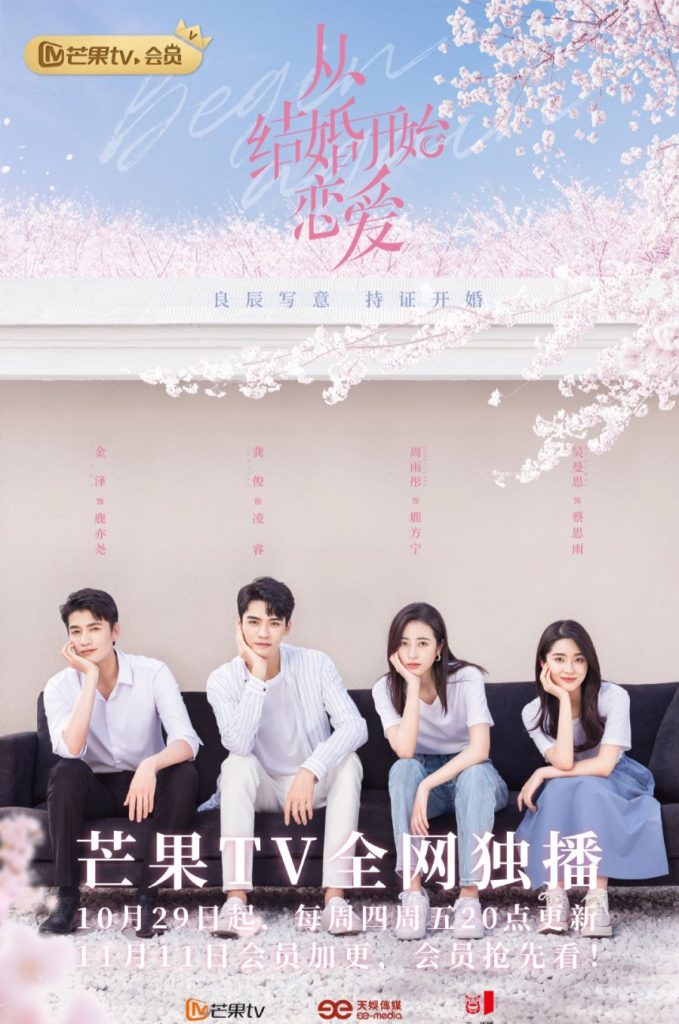Begin again
“Begin Again” is a heartwarming, romantic drama that explores the complexities of love, marriage, and personal growth against the backdrop of a corporate power struggle and medical profession. The film offers an intriguing take on the often-used “fake marriage” trope but elevates it through strong character development, engaging performances, and an emotional arc that keeps the audience invested from beginning to end.
The plot revolves around Lu Fang Ning, a high-powered, confident CEO who appears to have everything—beauty, intelligence, and wealth. However, despite her professional success, she succumbs to familial pressure and societal expectations, realizing she needs a husband and a child as she approaches her thirties. This leads her to the perfect candidate in surgeon Ling Rui, a kind-hearted, gentle man who is not only skilled in his profession but also seems to be the exact opposite of Lu Fang Ning in terms of personality. Their relationship begins with a sense of manipulation and strategy, as Lu Fang Ning schemes her way into his life. Yet, what begins as a marriage of convenience evolves into something far more genuine and heartfelt.
One of the film’s strengths is its portrayal of Lu Fang Ning as a multi-dimensional character. At first, she comes across as manipulative and single-minded in her pursuit of the perfect life on her terms. However, as the story unfolds, her vulnerabilities and insecurities come to the surface. The audience is invited to understand the societal and family pressures that drive her, making her far more relatable and sympathetic. Lu Fang Ning’s journey toward self-awareness and redemption is central to the film’s narrative arc. The gradual shift in her priorities—from viewing marriage as a mere contractual arrangement to realizing the emotional complexities of a real partnership—adds depth to her character. It’s a welcome departure from the typical one-dimensional portrayals of female CEOs in media, showing her evolution from a domineering businesswoman to someone capable of nurturing and understanding love.
Ling Rui, on the other hand, offers a perfect foil to Lu Fang Ning’s assertive personality. His warmth, patience, and moral integrity create an interesting dynamic between the two leads. He isn’t just a passive character caught up in Lu Fang Ning’s schemes. Instead, his strong sense of self and gentle nature serve as a calming balance to her intensity. His decision to enter into the marriage despite its unconventional beginnings speaks to his sense of duty and compassion, traits that ultimately endear him to the audience. His journey, while less overt, is equally important as he moves from a sense of obligation to genuine affection and love for Lu Fang Ning.
The chemistry between the leads is palpable, and their evolving relationship is portrayed with subtlety and nuance. The initial tension between them—created by their clashing personalities—eventually gives way to mutual respect, admiration, and, finally, love. Their interactions are filled with moments of humor, tenderness, and conflict, all of which feel organic and well-paced. The film excels in showing how their emotional walls break down over time, transforming a contractual relationship into a heartfelt and genuine connection.
Visually, “Begin Again” is polished and elegant, much like its leading lady. The settings, from Lu Fang Ning’s opulent corporate office to Ling Rui’s medical environment, are beautifully designed and serve as effective backdrops for the story. The contrast between the cold, calculated business world and the warm, empathetic world of medicine underscores the differences between the two protagonists and visually reinforces the film’s thematic concerns.
Thematically, the film touches on ideas of identity, societal expectations, and the sacrifices one makes in pursuit of love and happiness. Lu Fang Ning’s initial belief that success is measured by ticking off traditional milestones (such as marriage and motherhood) is challenged throughout the film. The film questions the notion of what it means to “have it all” and whether achieving such an ideal is worth compromising one’s true self. Ling Rui’s character, on the other hand, embodies the idea that love cannot be forced or manipulated but must grow naturally, which stands in stark contrast to Lu Fang Ning’s earlier approach to relationships.
While “Begin Again” excels in many areas, it’s not without its flaws. Some viewers may find the premise of a high-powered businesswoman scheming her way into a marriage somewhat clichéd, though the film does manage to rise above this with its nuanced character development. Additionally, there are moments when the pacing feels slightly uneven, particularly in the middle of the film, where the transition from a fake relationship to genuine love feels a bit rushed. More time spent exploring the emotional growth of the characters during this phase would have made the eventual resolution even more satisfying.
However, these minor shortcomings are easily overshadowed by the film’s strengths. “Begin Again” is ultimately a deeply emotional and uplifting exploration of what it means to love and be loved. Its central message—that relationships require effort, compromise, and emotional growth—is universally relatable. The film’s portrayal of a strong, independent woman who learns to balance her ambition with her emotional needs, and a kind-hearted man who teaches her the true meaning of love, offers a refreshing take on the romance genre.
In conclusion, “Begin Again” is a charming and heartfelt film that will appeal to fans of romantic dramas. With strong performances, particularly from the lead actors, and a compelling narrative that moves beyond superficial romance, it offers a satisfying and emotionally resonant story about love, growth, and the complexities of modern relationships.

